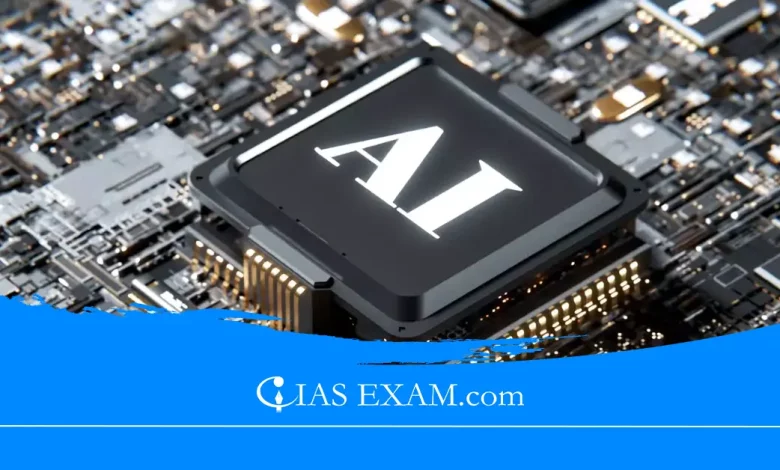Daily Current Affairs for UPSC
Advisory to Generative AI Companies For LS Elections
Syllabus- Science and Technology [GS Paper-3]

Context
Recently the IT Ministry has sent an advisory to generative AI companies like Google and OpenAI ahead of Lok Sabha Elections.
About
- Content Regulation: Intermediaries and platforms are mandated to ensure that the usage of Artificial Intelligence models does not permit customers to host, display, add, modify, post, transmit, keep, replace, or proportion any illegal content material, as outlined in IT Act.
- Electoral Process Integrity: Intermediaries and platforms should make sure that their computer resources do not permit any bias, discrimination, or threats to the integrity of the electoral method.
- Explicit Permission for Under-Testing AI: The deployment of under-testing or unreliable Artificial Intelligence models at the Indian Internet calls for express permission from the Government of India.
- Such models have to be labeled to inform users about their capacity fallibility or unreliability.
- User Awareness: Users need to be clearly informed,through terms of services and user agreements, about the outcomes of engaging with unlawful statistics at the platform.
- Labeling for Deepfakes and Misinformation: The businesses have to also label the AI-generated responses with a permanent specific identifier in order that the author or the first originator of any misinformation or a deepfake may be identified.
What is Generative Artificial Intelligence?
- It is AI algorithms and models designed to generate new content material, consisting of pics, textual content, audio, or even videos, that mimic or resemble human-created content.
- These models rely on deep gaining knowledge of structure and to discover styles and platforms in current records to create new and specific content.
Application of Generative AI
- Art and Design: It can create specific pieces of art, designs, and even song compositions.
- Content Creation: It can be used to generate text,including articles, stories, and poetry.
- Media Production: It can help in growing practical snap shots, films, and special effects for movies and games.
- Data Augmentation: It can improve statistics quality by means of artificially enriching datasets with extra information much like the original dataset but not formerly seen.
- Generative AI can remodel more than one industry’s applications which include Logistics and Transportation, Travel Industry, Supply Chain, Marketing and so forth.
Need for the Regulation
- Lack of transparency of AI tools: AI and deep gaining knowledge of models may be difficult to recognize, even for people who work without delay with the technology.
- AI isn’t always neutral: AI-based decisions are liable to inaccuracies, discriminatory outcomes, embedded or inserted bias.
- Manipulation via Algorithm: Online media and information have emerged as even murkier in light of AI-generated images and movies, AI voice changers in addition to deep fakes infiltrating political and social spheres.
- Deep Fakes: They contain hyper-sensible digital falsification, they are able to probably be used to harm reputations, fabricate evidence, and undermine trust in democratic establishments.
- Lack of Data Privacy: AI platforms frequently collect private facts to customize consumer stories or to help educate the AI models.
- Uncontrollable Self AI: There also comes a fear that AI will progress in intelligence so rapidly that it’ll act past people’ control— probably in a malicious manner.
Existing Laws in India
- India lacks specific legal guidelines to address deepfakes and AI-associated crimes, however provisions underneath the IT Act provide both civil and criminal comfort.
- Section 66E of the Information Technology Act, 2000 (IT Act) is relevant in cases of deepfake crimes that involve the capture, booklet, or transmission of a person’s pictures in mass media thereby violating their privacy.
- Such an offence is punishable with up to 3 years of imprisonment or a fine of ₹2 lakh.
- Section 66D of the IT Act punishes folks who use communication devices or computer resources with malicious rationale, leading to impersonation or dishonest.
- It incorporates a penalty of up to three years imprisonment and/or a fine of ₹1 lakh.
- Sections 67, 67A, and 67B of the IT Act may be used to prosecute people for publishing or transmitting deep fakes which might be obscene or incorporate any sexually express acts.
Way Ahead
- As deep fakes and different allied technology come to be tougher to detect, more assets are now reachable to equip individuals towards their misuse.
- AI governance in India cannot be confined to only a regulation and reforms ought to be targeted around establishing requirements of safety, growing focus, and group constructing.
Source: The Indian express
UPSC Mains Practice Question
Q.Discuss the significance and challenges of generative AI for India’s development and security. Suggest some measures that India needs to take to harness the opportunities and mitigate the risks of generative AI.





.png)



